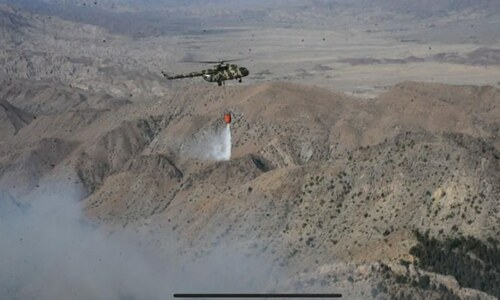EARLIER this month, Pakistan’s foreign minister, Bilawal Bhutto-Zardari, met his Iranian counterpart, Dr Amir Abdollahian, to review their countries’ relationship.
The past few years have seen serious gains across multiple facets of the two neighbours’ bilateral relations, due substantially to the efforts of Pakistan’s mission to Iran. The clearest indicator of improving relations has been the loan of Iran’s Ilyushin 76 — described as the largest firefighting aircraft in the world — to Pakistan to combat the deadly wildfires in Balochistan’s Koh-i-Suleman range.
However, the potential of improved Pak-Iran ties goes beyond isolated demonstrations of goodwill to socioeconomic windfalls for the two states.
Core to the discussions between the foreign ministers were ways to improve trade and economic ties, particularly ways in which the cross-border movement of people and goods could be facilitated.
Despite the two countries’ geostrategic proximity and potential for trade, for the first 75 years of Pakistan’s existence the two have shared only one border crossing. Since 2021, two more have become operational, greatly easing the passage of trade and peoples between the neighbours, including the hundreds of thousands of zaireen that cross the border annually. Border management agreements between the two have also been inked. These efforts have yielded tangible benefits in increased border security and counterterrorism efforts.
Further, to alleviate the issue of local communities potentially being affected by these measures, the two states are instituting visa-free border markets where these populations can freely mingle and trade.
Discussions also involved the import of additional energy from Iran to strengthen regional energy cooperation and ameliorate Pakistan’s current energy crisis and its energy dependency on Western-adjacent states. Bilawal proposed the resumption of the Iran-Pakistan gas pipeline project initiated by former president Asif Ali Zardari. The deal for the 2,775-kilometre pipeline was struck in 1995. Iran completed its section of the pipeline in 2011; however, Pakistan’s length of the pipeline has been hampered by sanctions on Iran. These coercive measures, intermittently imposed by the US, EU and the UN, have severely hampered Tehran’s efforts at diplomatic and economic outreach.
The United Nations implemented and progressively broadened economic sanctions on Iran through UNSC Resolutions 1696, 1737, 1747, 1803, 1835 and 1929.
While the threat of international sanctions remains a key concern for Pakistan, it does not preclude Pak-Iran economic cooperation.
Against this backdrop, UNSC Resolution 2231, passed in 2015, represented a key breakthrough for Tehran, outlining a schedule for the suspension and eventual cessation of UN sanctions. This resolution was passed after the 2015 Joint Comprehensive Plan of Action, commonly known as the ‘Iran nuclear deal’. Under the terms agreed to in the JCPOA, UN sanctions on Iran expired on Oct 18, 2020.
However, America’s wavering positions on Tehran has created dilemmas for Pakistan.
In 2010, parallel to UN sanctions, the US imposed secondary sanctions on Tehran, compelling foreign entities to withdraw their investments from Iran. In 2012, the US Iran Sanctions Act pressured purchasers of Iranian oil to progressively reduce their purchases or risk isolation. While the JCPOA of 2015 suspended the remaining secondary sanctions against Iran, it retained provisions related to primary sanctions restricting Iran’s support for extremism, the ballistic missiles programme, and arms-related transactions.
Also, despite the thawing of relations between the US and Iran leading up to the JCPOA, sanctions prohibiting commercial activity between the two have persisted under the US Iranian Transactions and Sanctions Regulations. In 2018, the US unilaterally withdrew from the JCPOA, and imposed further sanctions on Iran. These sanctions were augmented in 2020. While the US has also granted exemptions to countries such as Turkey, Iraq, India and others — allowing them to trade in the energy sector with Iran — it has not extended such favours to Pakistan.
Another concern for Pakistan is the Financial Action Task Force’s blacklisting of Iran. While the FATF does not prohibit trade relations with blacklisted states, such engagements may bring global scrutiny to Islamabad.
Editorial: FM’s Iran visit
While the threat of international sanctions remains a key concern for Pakistan, it does not preclude Pak-Iran economic cooperation. The pipeline today itself is not subject to UN sanctions, and the US has granted exemptions to countries such as Turkey, India, and Iraq in petrochemical trade with Tehran. In any case, Pakistan and Iran may also conduct their trade by way of barter to ensure that US sanctions are not triggered.
Iran’s place as a regional power and its oil and gas reserves should prompt Islamabad to improve ties with Tehran. In our neighbourhood, Beijing accounts for 25 per cent of Tehran’s imports and is the number one buyer of Iranian oil today. India was the second-biggest customer of Iranian oil until 2019. Nonetheless, India remains ready to re-engage with Iran, with an anonymous Indian official stating that “once the sanctions are lifted, we can look to resume oil imports from Iran”.
Even if the sanctions persist, there are avenues to explore. In addition to petitioning the US for exemptions, Pakistan can trade directly with Iran by way of barter: for instance, trading some of its rice and meat surpluses with Iran in exchange for Iranian gas and energy. A similar solution can apply to trade with Afghanistan, which, in the wake of the crushing US sanctions, has been left in a state of economic turmoil. Barter would also free Pakistan from its reliance on the US dollar, easing pressure on our foreign exchange reserves. Pakistan can also seek to import petrochemicals from Azerbaijan and Turkmenistan by way of Iran. It can directly pay royalties for this use of Iran’s pipeline network or provide Iran with a percentage of the gas so imported as royalties. Parallels can be drawn with existing arrangements whereby Pakistan trades with Turkey and other Central Asian states by way of land routes through Iran.
Pakistan and Iran have shared sociocultural and geostrategic interests. While Pakistan must continue to foster improved ties with states further afield, such as the US or the EU bloc, it must nonetheless cultivate reliable partnerships — in similar vein as the Pak-China relationship — with other friendly states in the region. Greater engagement with Iran — particularly on shared issues such as energy security or counterterrorism efforts — is thus necessary to ensure a safer and more prosperous Pakistan.
The writer is former legal adviser to Pakistan’s foreign ministry, and faculty, Lums Law School.
Published in Dawn, July 1st, 2022



































